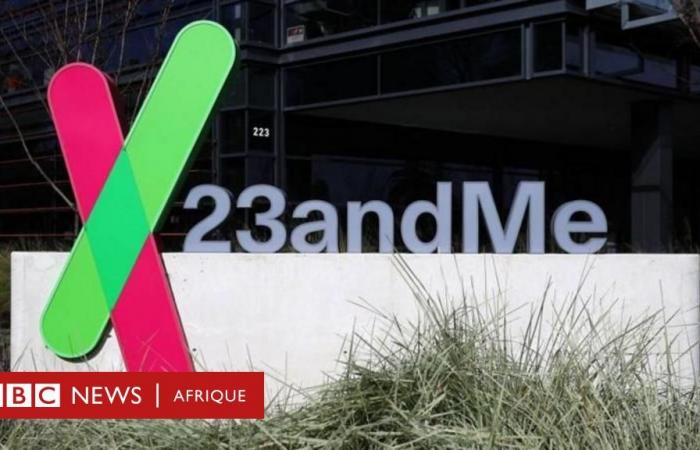
Photo credit, Getty Images
- Author, Zoe Kleinman
- Role, Technology Editor, BBC
-
an hour ago
Three years ago, the company 23andMe, specializing in DNA testing, experienced dazzling success, its share price surpassing that of Apple. But those heady days when millions of people rushed to send him saliva samples in exchange for detailed reports on their ancestry, family ties and genetic makeup are over.
But the heady days when millions of people rushed to send it saliva samples in exchange for detailed reports on their ancestry, family ties and genetic makeup are over, and the company is now fighting for its survival .
Its stock price collapsed, and this week it was on the verge of being delisted from the stock exchange.
This is, of course, a company that holds the most confidential information about its customers imaginable, raising worrying questions about what might happen to its enormous – and extremely valuable – customer base. data on individual human DNA.
Contacted by the BBC, 23andMe was optimistic about its prospects and insisted that it remained “committed to protecting our customers’ data and has a constant focus on respecting the privacy of its customers.” customers.”
But how did such a successful technology company end up having to answer questions about its own survival?
DNA gold rush
It wasn’t that long ago that 23andMe was in the news for all the right reasons.
Its celebrity clients included Snoop Dogg, Oprah Winfrey, Eva Longoria and Warren Buffet, and millions of users experienced unexpected, life-changing results.
Some have discovered that their parents were not who they thought they were or that they had a genetic predisposition to serious health problems.
The stock price soared to US$321.
Three years later, that price has collapsed to just under $5, and the company is worth only 2% of what it was before.
What went wrong?
Photo credit, Getty Images
According to Professor Dimitris Andriosopoulos, founder of the Responsible Business Unit at the University of Strathclyde, Scotland, the problem with 23andMe can be explained in two ways.
First, there was no ongoing business model: once you’d paid for your DNA report, there wasn’t much to keep you coming back.
Second, plans to use an anonymous version of the collected DNA database for drug research have taken too long to be profitable, as the process of developing a drug takes many years.
This brings him to a stark conclusion: “If I had a crystal ball, I would say maybe they will last a little bit longer,” he told the BBC.
“But as things stand, in my opinion, it is very unlikely that 23andMe will survive.
23andMe’s problems are reflected in the turmoil of its leadership.
The board resigned over the summer and only CEO and co-founder Anne Wojcicki (sister of the late YouTube CEO Susan Wojcicki and ex-wife of Google co-founder Sergei Brin) remains on the board. original team.
Rumors have circulated that the company will soon disappear or be sold, which the company denies.
“23andMe co-founder and CEO Anne Wojcicki has publicly stated that she intends to take the company private and is not prepared to consider acquisition proposals from third parties,” the company said. company in a press release.
That hasn’t stopped speculation, and rival company Ancestry has asked U.S. regulators to intervene if 23andMe is sold.
Photo credit, Getty Images
What about DNA?
The rise and fall of businesses is nothing new, especially in the technology sector. But 23andMe is different.
“It’s concerning because of data privacy,” says Carissa Veliz, author of Privacy is Power.
And this doesn’t just apply to people who have used the company.
“If you give your data to 23andMe, you are also giving them the genetic data of your parents, your siblings, your children and even distant relatives who have not given consent,” she said at the BBC.
David Stillwell, professor of computational social sciences at Cambridge Judge Business School, agrees that the stakes are high.
“DNA data is different. If they hack your bank account data, it will be damaging, but you will be able to get a new bank account,” he explained.
“If your (non-identical) siblings have used it, they share 50% of your DNA, and so their data can be used to make predictions about your health.
The company is adamant that these concerns are unfounded.
“Any company that processes consumer information, including the type of data we collect, has data protection measures in place that are enforced by law and must be respected in connection with any change of ownership future,” she said in her statement.
“The 23andMe Terms of Service and Privacy Statement will remain in effect unless customers are made aware of and agree to the new terms and statements. »
There are also legal protections that apply in the UK under the UK version of the data protection law, GDPR, whether the company goes bankrupt or changes hands.
However, all businesses can be attacked by hackers, as was the case with 23andMe 12 months ago.
Carissa Veliz is concerned and says that ultimately a much more robust approach is needed to keep our most personal information safe.
“The terms of service for these companies are often incredibly inclusive; when you give them your personal data, you’re giving them permission to do pretty much what they want with it,” she said.
“Until we ban the trade in personal data, we will not be sufficiently protected.
Additional information from Tom Gerken
Click here to read more articles from BBC News World.
Subscribe to our new newsletter here to receive a selection of our best content of the week every Friday.
You can also follow us on YouTube, Instagram, TikTok, X, Facebook and our WhatsApp channel.
And don’t forget that you can receive notifications in our app. Download the latest version and activate them.





